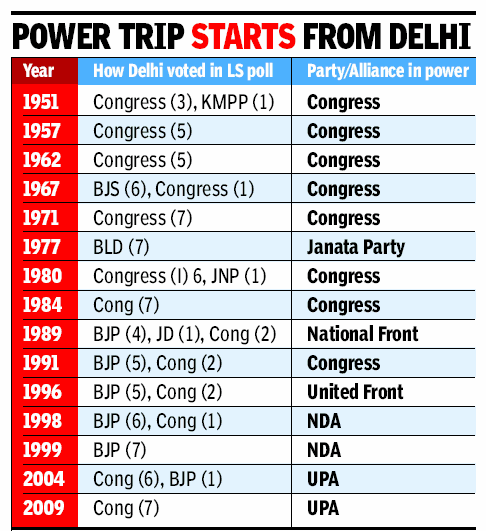Delhi: Parliamentary elections
| Line 17: | Line 17: | ||
TIMES INSIGHT GROUP | TIMES INSIGHT GROUP | ||
| − | [[File: DelhiParl. | + | [[File: DelhiParl.png||frame|500px]] |
[http://epaper.timesofindia.com/Default/Scripting/ArticleWin.asp?From=Archive&Source=Page&Skin=TOINEW&BaseHref=CAP/2014/04/10&PageLabel=8&ForceGif=true&EntityId=Ar00804&ViewMode=HTML The Times of India ] | [http://epaper.timesofindia.com/Default/Scripting/ArticleWin.asp?From=Archive&Source=Page&Skin=TOINEW&BaseHref=CAP/2014/04/10&PageLabel=8&ForceGif=true&EntityId=Ar00804&ViewMode=HTML The Times of India ] | ||
Revision as of 12:39, 10 April 2014
This is a collection of articles archived for the excellence of their content. Readers will be able to edit existing articles and post new articles directly |
Delhi results reflect national results
Capital a bellwether for national results
TIMES INSIGHT GROUP
New Delhi: Given the fact that Delhi accounts for just seven of 543 Lok Sabha seats, it might seem like what happens in the capital is just a minor detail in the larger national calculus. The fact, however, is that Delhi has reflected the national mood with remarkable accuracy over the years, at least as far as the Congres and BJP — or the erstwhile Jan Sangh — are concerned.
So will what happens in Delhi on Thursday decide India’s fate in 2014? Don’t bet against it. The odds seem heavily in favour of that happening.
In the 15 Lok Sabha elections till date (beginning 1952), only twice, in 1967 and 1991, has a party lost a majority of the seats in Delhi and gone on to be part of the government in New Delhi. Even on those two occasions, the results in the capital did indicate a larger national trend.
In 1967, the Jan Sangh won six seats and the Congres just one; the latter formed the central government led by Indira Gandhi [with a greatly reduced majority. Besides, several north Indian states voted somewhat like Delhi did.] This was the year in which the Congres faced major setbacks across northern India. Non-Congres governments came to power across the region, giving rise to a popular saying that for the first time you could travel from West Pakistan to East Pakistan through India without setting foot on Congres territory. Its Lok Sabha tally too dropped below 300 for the first time.
In 1991, the BJP won five seats and the Congres two, but P V Narasimha Rao headed the government in New Delhi. However, Congres failed to get a majority in the Lok Sabha; but for the sympathy wave that followed Rajiv Gandhi’s assassination mid-way through the polls, it would quite possibly have failed to form the government.
These two elections apart, a loss in Delhi has meant bidding goodbye to hopes of ‘power’ at the Centre. The capital has seen clean sweeps in seven of the 15 LS polls. On each occasion, the party sweeping the capital — Congres in 1957, 1962, 1971, 1984 and 2009; Janata Party in 1977 and BJP in 1999 — has won a majority in LS, either on its own or with its pre-poll allies.
